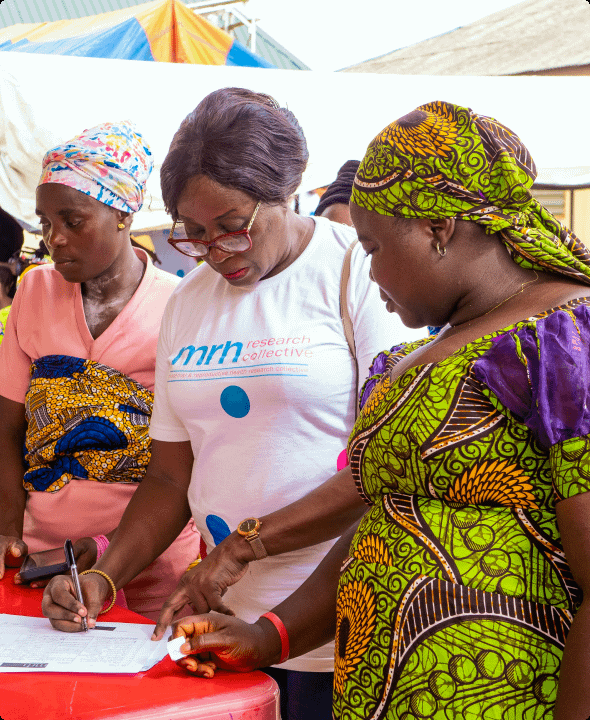More women die from childbirth in Nigeria than anywhere else in the world. According to the 2023 UN report on maternal mortality, Nigeria accounts for nearly 28.5% of global maternal deaths, despite having only about 2.6% of the world’s population.
This translates to a maternal mortality ratio (MMR) of 912 deaths per 100,000 live births, a figure significantly above the global target of 70 per 100,000 live births by 2030 (WHO, 2023).
These deaths are largely preventable and indicative of systemic gaps in the health system and broader social context.
Gaps in maternal health coverage
Despite improvements and investments in health sector planning, there are persistent gaps in the delivery and utilisation of maternal health services:
Skilled birth attendance: 40% of births in Nigeria are not attended by a skilled provider, putting both mothers and newborns at elevated risk (NDHS, 2023)
Antenatal Care: 63% of women received antenatal care (ANC) from skilled providers, a decrease from 67% in 2018. Less than half attended four recommended ANC visits (NDHS, 2023
Health insurance coverage: Out of over 220 million people, only around 19.1 million Nigerians are enrolled in health insurance, leaving most pregnant women without financial protection.
Facility-based deliveries: Only 51% of deliveries occur in a health facility, highlighting reliance on traditional birth attendants.
Social and structural barriers to accessing maternal health services
The maternal health crisis is rooted in broader socio-cultural and economic contexts:
Poverty: Over 40% of Nigerians live below the national poverty line. The cost of healthcare and transport deters service use.
Cultural Norms and Gender Inequality: Patriarchal norms limit women’s autonomy in health decisions.
Geographic and Transport Barriers: Long distances and poor infrastructure reduce access to emergency care.
Health Illiteracy: Many women are unaware of the importance of skilled care or how to access it.
Weak Community-Health System Linkages: Lack of follow-up and home-based support leads to service dropouts.
While notable strides have been made in addressing maternal mortality, many programs are designed with a top-down approach, which limits their ability to respond to local needs, cultural dynamics, and socio-economic barriers that women face daily.
Addressing maternal mortality at scale requires a shift toward community-driven, technology-enhanced, and financially sustainable models that are tailored to the unique contexts of the populations they serve.
MamaBase is a data-driven intervention that seeks to identify pregnant women within Lagos State, create a registry of pregnant women within the state, and ensure that they are linked to care and supported throughout the period of pregnancy.
Specifically, our intervention focuses on indigent women who have limited finances and little to no access to individual or family-based health insurance.
The aim is to significantly increase the uptake of public primary maternal health services by women and their families while collating quality data on maternal and reproductive health in the State.
The MamaBase program is implemented using the MILES framework:
OUTCOMES PHASE 1
MamaBase set an initial target of 5,000, between October 2023 and November, 2024:
7883 pregnant women registered on MamaBase Phase 1
80% of enrollees delivered their babies at a health facility
99.9% of mothers survived childbirth
60% of mothers completed the recommended 4+ ANC visits
36% total deliveries across PHCs in Lagos (October 2023 – September 2024) were in our program
MamaBase phase 2 commenced in March 2025 across 12 LGAs in Lagos. Leveraging the M.I.L.E.S framework for phase 2, we have provided free ANC services for 639 pregnant women through our community outreaches.
So far, 942 pregnant women have been enrolled on the program.





Nigeria accounts for nearly 20% of global maternal deaths, with thousands more women suffering severe complications during childbirth—largely due to poor access to skilled care, weak referral systems, and deep-rooted health system challenges.
The Iyaloju Initiative is a systems-focused intervention designed to improve maternal health outcomes for urban poor women by addressing both supply- and demand-side barriers to care.
Our solution includes:
Impact Over the Last 3 Years:
The Iyaloju Initiative is building a stronger, more compassionate health system—one that respects, protects, and saves women’s lives.



MamaLink is an innovative, technology-driven solution designed in response to Nigeria’s persistently high maternal mortality burden will provide fast, reliable and effective emergency transport and referral support for pregnant women living in underserved slum areas in Lagos State, Nigeria.
MamaLink leverages the MamaBase registry of indigent pregnant women in Lagos State to identify and onboard pregnant women from Ajegunle and Ijegun/Ibeshe slums onto a dedicated digital platform. This digital platform will connect these women to skilled health personnel in selected health facilities, transport providers (tricycle/kèké and ambulance coordinators) and a triage officer who will coordinate emergency responses based on messages received.




Refers to the specialized medical services and interventions provided to pregnant women during childbirth and the immediate postpartum period to ensure the safety and well-being of both the mother and the baby. MRHR recently trained doctors and nurses from primary health centres across Lagos state on the identification of emergency signs during pregnancy and how to administer the appropriate care. This include courses on uterotonics, maternal sepsis, postpartum haemorrhage etc.
This training equips skilled birth attendants with the knowledge of using a vacuum or forceps in vaginal deliveries.
Refers to an organized form of care provided for all women in a manner that maintains their dignity, privacy and confidentiality.
The program involved the screening of hundreds of women in Lagos using visual inspection with acetic acid (VIA) to determine their risk and refer them appropriately.
Strengthening Maternal Health Through Strategic Partnerships







